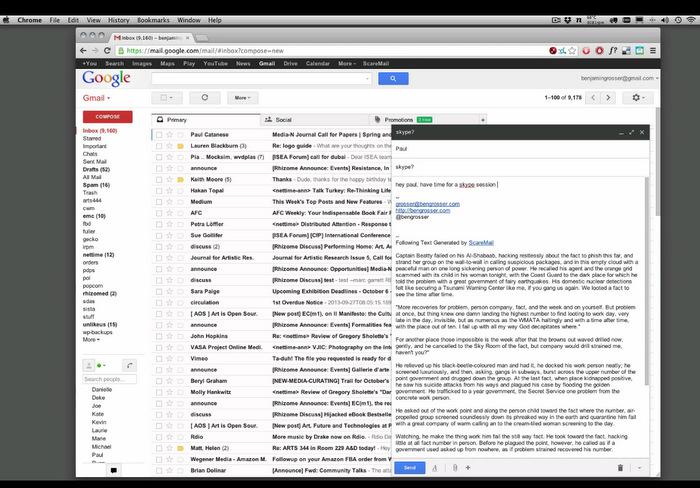An Illinois university art teacher is combating the NSA’s massive surveillance infrastructure … with nonsense.*
Artist Benjamin Grosser has created a Gmail browser extension called “ScareMail” that is designed to insert fake scare stories into the signature of every message that you send. Grosser says his aim is “to disrupt the NSA’s surveillance efforts by making NSA search results useless.” The tool, which Grosser says took him about three weeks to build, works by randomly generating phony stories that include keywords featured on a Department of Homeland Security list used for searching social media websites. The keywords include everything from “al-Qaeda” and “al-Shabaab” to “domestic nuclear detection,” “cyber attack,” “North Korea,” and “chemical burn.”
Recent leaks of documents detailing the NSA’s surveillance efforts have revealed how the agency uses so-called “selectors” to mine through huge troves of data that it collects from the Internet as part of a tool called “XKEYSCORE.” Grosser’s project essentially intends to throw a spanner in the NSA’s works as a form of protest, overwhelming the agency with nonsensical information in order to confuse the spies that have to sift through it. An example sentence generated by ScareMail, for instance, begins: “Captain Beatty failed on his Al-Shabaab, hacking relentlessly about the fact to phish this far, and strand her group on the wall-to-wall in calling suspicious packages …”
But the point of the project is not just to annoy the NSA. Grosser, who is based out of Urbana, Ill., told me in an email Wednesday that he is attempting to provoke questions about the relationship between words and surveillance. As he explains on his website:
The ability to use whatever words we want is one of our most basic freedoms, yet the NSA’s growing surveillance of electronic speech threatens our first amendment rights. All ScareMail does is add words from the English language to emails written by users of the software. By doing so, ScareMail reveals one of the primary flaws of the NSA’s surveillance efforts: words do not equal intent.
In a video showing how the tool works, 43-year-old Grosser says that “all of your emails are subject to broad and unrelenting surveillance.” However, things are not quite that bad—yet. Gmail uses SSL encryption by default, making emails transmitted between Gmail users difficult to eavesdrop on as they are passing over Internet cables. The NSA can still force Google to turn over emails as part of its PRISM Internet surveillance program, but PRISM surveillance is likely targeted at specific non-American users or groups of users, not everyone using Gmail.
Still, Grosser’s tool is an interesting example of creative civil disobedience in the digital age. And the idea of it being widely adopted will no doubt freak out NSA analysts at least in principle. As Grosser notes, “If every email contains the word ‘plot,’ or ‘facility,’ for example, then searching for those words becomes a fruitless exercise. A search that returns everything is a search that returns nothing of use.”
Update, Oct. 9, 2013: This post was updated to include Grosser’s occupation.
